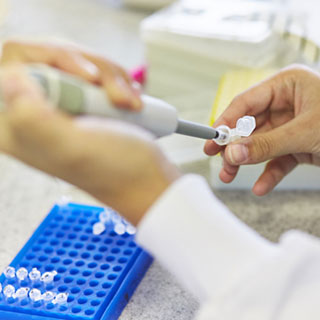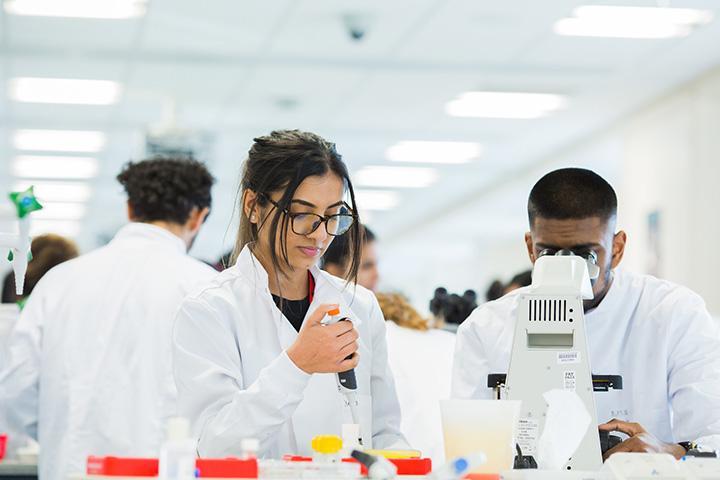
Medical life science careers
Where can our courses take you?
The career opportunities for medical life sciences graduates are infinite.
You could be making life-changing discoveries in the lab, providing essential medical care to patients, or supporting the medical and pharmaceutical industries in a financial, legal, or distribution role.
You may already have a career path mapped out, or you might still be at the research stage. Knowing which course will set you on the way to achieving your goals is crucial.
We've created this career outcomes guide to highlight the key differences between our three medical life sciences courses, and to help you make the right decision for your future.
Which course is right for you?
Use the course comparison table to quickly check which course(s) offer the route to your dream career, or choose a course and learn more about the roles available.
Jump to:
Course comparison - key career outcomes
Compare the key career options available to graduates of our medical life science courses.
Roles marked * require further study after completion of your undergraduate degree.
| Course/Career role | BSc (Hons) Clinical Sciences | BSc (Hons) Healthcare Science | BSc (Hons) Biomedical Science |
|---|---|---|---|
| Lab-based scientific roles |
|
|
|
| NHS professional roles |
|
No direct routes | |
| Healthcare professional roles |
|
|
|
| Non-lab-based scientific roles |
|
|
|
| Business roles |
|
|
|
| Further education |
|
|
Career paths for a Clinical Sciences graduate
Healthcare professionals
- Graduate entry medicine and dentistry: apply the principles and procedures of medicine to prevent and diagnose illness, disease and injury, care for patients, and maintain their physical and mental health
- Physician associate: work alongside doctors and surgeons as part of a multidisciplinary team
- Allied healthcare professional such as a diagnostic radiographer: use imaging technology to help understand and diagnose patients' conditions
NHS professionals
- Health policy analyst: advise central government on health policy
- Health informatics analyst: recognise and analyse trends in healthcare
- NHS Trust manager: enable the delivery of services by ensuring healthcare professionals have what they need to care for patients
Business roles
- Patent attorney: advise clients on the potential patenting of new medical device designs and inventions
- Accountant: help businesses make critical financial decisions
Lab-based scientific roles
- NHS-qualified clinical scientist: become an expert with a specialism in, for example, cardiac physiology or audiology. Support clinical staff in their work with patients
- Researcher and developer: develop new medicines for the pharmaceutical industry
- Academic researcher: complete a PhD and generate new knowledge through high-level research
Non-lab-based scientific roles
- Clinical trial analyst: collect and analyse data from clinical trials carried out in hospitals
- Medical representative: sell products such as medicines and medical equipment to GPs, hospital doctors, pharmacists and nurses
Further education
Options to continue in education include:
- Postgraduate Master's or PhD study
- A Bachelor of Law (LLB) degree: pursue a career as a patent attorney
- Postgraduate Certificate in Education (PGCE): use your scientific knowledge to teach and inspire the next generation
Career paths for a Healthcare Science graduate
Scientific roles
- NHS-qualified biomedical scientist with accreditation from the Institute of Biomedical Science (IBMS) and Health and Care Professions Council (HCPC): practice in NHS pathology laboratories as a biomedical scientist
Other careers
- Although this programme is designed to lead to a career in the NHS, it's not limited. The options available to Biomedical Science graduates are also available.

Career paths for a Biomedical Science graduate
Lab-based scientific roles
- Researcher and developer in the pharmaceutical or biotechnology industries: develop new medicines
- Healthcare support worker or medical lab assistant: work in NHS and public health labs
- Cosmetics developer or safety tester
- Food and water industry tester
- Veterinary lab worker: use histology and microbiology skills to work in veterinary lab services
- Academic researcher: complete a PhD and generate new knowledge through high-level research
Healthcare professionals
With a Biomedical Science degree you can transfer to:
- Graduate entry medicine or dentistry: apply the principles and procedures of medicine to prevent and diagnose illness, disease and injury, care for patients, and maintain their physical and mental health
- Physician associate: work alongside doctors and surgeons as part of a multidisciplinary team
Non-lab-based scientific roles
- Clinical trial analyst: collect and analyse data from clinical trials carried out in hospitals
- Medical representative: sell products including chemicals, research kits and equipment to schools, universities and hospitals
Business roles
- Patent attorney: make decisions on the patenting of new pharmaceuticals within a company
- Management and finance roles: a Biomedical Science degree is a stepping stone to these roles
Further education
Options to continue in education include:
- Postgraduate Master's or PhD study
- A Bachelor of Law (LLB) degree: pursue a career as a patent attorney
- Postgraduate Certificate in Education (PGCE): use your scientific knowledge to teach and inspire the next generation
More about our courses
Visit our medical life science programme pages for details on course content, entry requirements, application information, start dates, and fees.
BSc (Hons) courses
Our three-year courses. Clinical Sciences BSc (Hons) also offers a four-year option with a placement year.
Foundation course
Our Foundation in Clinical Sciences and Medicine leading to BSc Clinical Sciences is a four-year course, featuring a Foundation Year and three years at undergraduate level.
